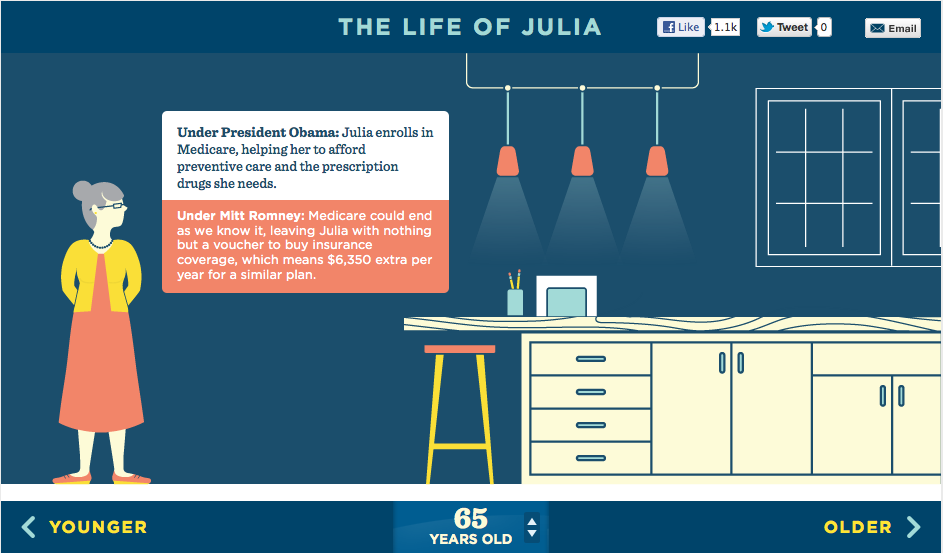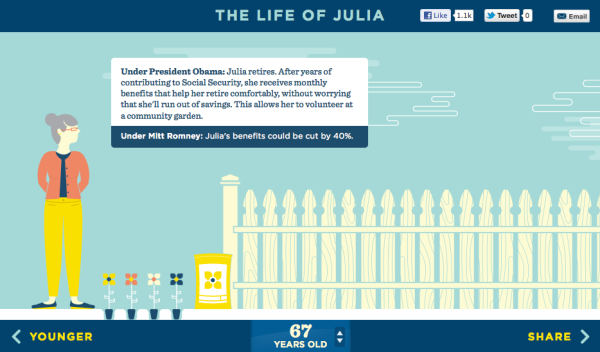The Obama campaign came out with a nifty, interactive online graphic Thursday that guides America through the life of Julia, a hypothetical young web designer who appears to have been drawn by Chris Ware or Dan Clowes. She has two paths: One in which she benefits at every stage of her life from the policies of Barack Obama, and one in which she is hurt at every stage of her life by the policies of Mitt Romney. But all is not what it seems.
The problem is that some of what the Obama campaign is promising Julia in 2012 won’t be there when she grows older, even if Obama’s current policy proposals are enacted by the Congress.
The most glaring example is Julia at the age of 65, when the Obama campaign says she will benefit from enrollment in Medicare under Obama, so she can afford the prescription drugs and preventative care she needs. In the alternative Mitt Romney scenario, Julia is left with a version of the Paul Ryan plan, which gives her a voucher to buy private insurance and leaves her with a lot more out of pocket expenses. Here is the slide:
But is that really the Obama plan for Medicare? Last summer, the White House agreed, as part of a grand bargain attempt with Speaker John Boehner that Obama praised, to allow the eligibility age for Medicare to gradually increase. The exact mechanism for this increase was never made public, but Politico and others reported at the time that the proposal would gradually increase the eligibility age to 67 over the next two decades. In a press conference at the time, Obama embraced the idea of “meaningful changes to Medicare, Social Security, and Medicaid” to “make sure those programs were there for not just this generation but for the next generation.” He continued:
If you look at the numbers, then Medicare in particular will run out of money and we will not be able to sustain that program no matter how much taxes go up. I mean, it’s not an option for us to just sit by and do nothing. And if you’re a progressive who cares about the integrity of Social Security and Medicare and Medicaid, and believes that it is part of what makes our country great that we look after our seniors and we look after the most vulnerable, then we have an obligation to make sure that we make those changes that are required to make it sustainable over the long term.
In other words, it was Obama’s belief that the best way to protect Medicare and Social Security would be to reduce benefits. The deal Obama was negotiating fell apart, but Obama has not since backed away from this statement. And it is almost a certainty, given the fiscal realities of the nation, that some sort of reductions in Medicare benefits will be required in the coming years. Obama still supports the idea of a grand compromise, which would pair benefit cuts with tax increases, and would presumably continue to pursue it if he was elected to a second term.
That brings us to Julia at the age of 67, when the campaign informs us that under Obama she will receive monthly benefits that will allow her to “volunteer at a community garden,” while under Romney she could see her Social Security benefits cut by 40%.
The latter figure–note the word “could”–is wild speculation. Romney has put forward no plan that calls for a 40% cut in Social Security benefits. (Romney has, however, put forward unrealistic top line spending projections that he has yet to justify with specific proposals.) But it is also true that Obama’s own plans call for some cuts to Social Security, cuts which Julia is not being told about here. In the 2011 debt limit negotiations, the White House entertained and then rejected a Republican plan to raise the retirement age under Social Security. But Obama did embrace a change in the formula that calculates inflation adjustments for Social Security, effectively reducing benefits for women like Julia. At the time, Major Garrett of National Journal described the agreement this way:
House GOP aides also said the White House had agreed to shift the inflation calculations embedded in the current Consumer Price Index (CPI) to the so-called “chained” index that economists say more accurately reflects buying trends and behavior in times of inflation. The chained rate – or chained-CPI – is less generous to recipients of Social Security because it less aggressively adjusts inflation upwards, meaning the rate of benefit increases slows.
Obama seemed to defend the position at the time. “Making changes to these programs is so difficult that this may be an opportunity for us to go ahead and do something smart that strengthens Social Security and gives not just this generation but future generations the opportunity to say this thing is going to be in there for the long haul,” Obama said. There has been no indication since that his position has changed.
In his 2012 State of The Union, Obama put it this way: “I’m prepared to make more reforms that rein in the long-term costs of Medicare and Medicaid, and strengthen Social Security, so long as those programs remain a guarantee of security for seniors.”
When I contacted the President’s campaign for a comment, I was told that the President’s plans for compromise, as described in the State of the Union, are less important than his budget proposal. “Although the President entertained additional changes to Social Security and Medicare in the past as part of a compromise to reach a balanced solution to the deficit problem,” one Obama campaign official told me Thursday, “his budget does not propose specific steps to change the calculation of Social Security benefits or the Medicare retirement age.”
This same official contested my argument that Julia was being misled, saying that the purpose of the graphic was to show the big difference between the plans of Obama and Romney, and how those plans would impact someone like Julia. It is true that there is a big difference between the Romney plan to turn Medicare into a voucher system, and Obama’s plan to trim around the edges while raising taxes to make up the rest. And on Social Security, we know that Romney has entertained raising the eligibility age in a way that Obama rejected during the 2011 debt ceiling negotiations.
But the fact that these differences are highlighted does not make the graphic accurate. Julia has simply not been informed in this graphic of a central truth of the coming presidential contest: Both candidates want to reduce Social Security and Medicare benefits in the out years, even if they differ on how much to cut and how to do the cutting. That means that no matter what happens in November, Julia will never get to experience her own out years in quite the way that the nifty Obama cartoon suggests.



